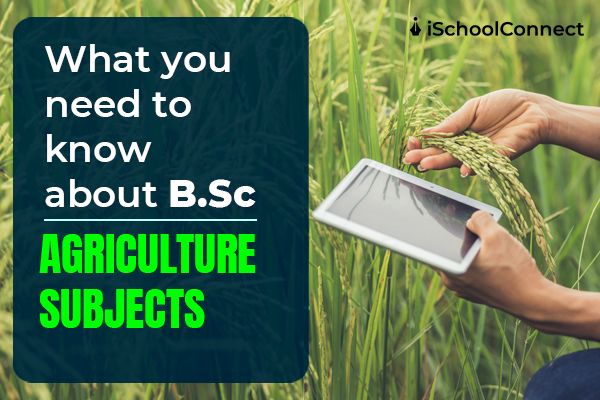Table of Contents
BSc in agriculture | An introduction
Agriculture being a huge contributor to employment, approximately 60% of the Indian population works in the industry. BSc Agriculture is a 4 year multidisciplinary study that comprises numerous disciplines in which students learn about a wide range of domains relating to agriculture and associated science. Practical experience and internship programs are also part of the program to enhance your learning experience. Along with BSc Agriculture subjects the course curriculum includes field visits, lab sessions, practical training, livestock training, and other activities.
A one-semester internship is also required as part of the BSc Agriculture curriculum (Rural Agricultural Work Experience). The majority of the courses in this field are practical, with an emphasis on “hands-on” experience and “learning by doing.”
Listed below are all the subjects you will be required to study in the 4 year BSc Agriculture course.
Scope of BSc in agriculture
Despite being a noble profession and provider to the economy, agriculture remains a low-skilled industry. Agricultural expertise is needed today more than ever due to exponential population growth and growing demand for goods. Therefore, even if other sectors experience setbacks, this industry will continue to employ many people to fill in the gaps of providing for the population of the country.
Students can pursue higher education by studying a Masters in Agricultural Sciences, a Master in Sciences (MSc) in disciplines such as biotechnology, rural banking, international agribusiness, or an MBA in Agriculture after graduation.
The following is a BSc agriculture subjects semester wise break down for a detailed explanation on what each semester has to offer –
An insight into year 1 of BSc in agriculture

The first-year subjects of BSc Agriculture teach the principles and the management aspects of agriculture. For a more advanced approach to the traditional methods of agriculture, the course also includes subjects based on Computer applications and English communications skills.
In a nutshell, the first year teaches the basics of finances and economics, which eventually help in the better management of market aspects of the field.
Semester 1
- Rural Sociology and the Constitution of India
- Educational Psychology
- Plant Biochemistry
- Introduction to Computer Application
- Communication and Comprehension Skills in English
Semester 2
- Principles of agricultural economics
- Farm management
- Production economics
- Trade and prices
- Agricultural finance and cooperation
- Agricultural marketing
- Fundamentals of agribusiness management
Diving into year 2 of BSc in agriculture
The 3rd semester of the BSc Agriculture subjects dives deeper into the engineering fronts of elements such as soil and water. The semesters in this year also go on to include the technical aspects and applications for the processes involved. Moreover, they also include how applications such as energy sources and power are applied and utilized in the field.
The fourth semester consists of Agricultural Entomology courses that give students an understanding of various topics and approaches in the field.
Semester 3
- Soil engineering
- Water engineering
- Machinery
- Farm power
- Structures of agro-processing and cultivation
- Application of energy sources in agriculture
Semester 4
- Principles of Entomology
- Economic Background of Entomology
- Introduction to Sericulture
- Crop Pests and Management
The evolution in year 3
The 3rd year BSc Agriculture subjects focus on extension methodology, blending technology with agriculture and the entrepreneurial front. Subjects like communication skills help you to use your knowledge in the entrepreneurial front in Agriculture. The second half of the 3rd year introduces you to the Microbiology discipline.
Semester 5
- Dimensions of Agricultural Extension
- Extension Methodologies
- Agricultural Technologies – Their Functioning and Management
- Communication Skills
- Entrepreneurship development
Semester 6
- Introduction to Microbiology
- Aspects of Agricultural Microbiology
- Soil Microbiology
The culmination in year 4

The 7th Semester BSc Agriculture subjects help you get accustomed to the fundamentals as well as the importance of applying statistics in Agriculture.
However, in the last semester the curriculum deals with more advanced aspects such as organic farming, agronomy, and working with new techniques such as watershed management and others to enhance the operations in the field.
Semester 7
- Principles of Statistics
- Fundamentals of Statistics
- Importance of Statistics in Agriculture
Semester 8
- Introduction to Agronomy
- Principles of Agronomy
- Agricultural Meteorology
- Weed Management
- Experimental Techniques in Agricultural Research
- Sustainable Agriculture
- Organic Farming
- Farming System
- Irrigation Water Management
- Crop Production
- Watershed Management
- Rain-fed Agriculture
What we have to say
For graduates with a BSc in agriculture, there are additional self-employment options apart from opting for a job. Graduates can start their own consulting business and advise farmers on how to improve their agricultural operations and crop yields. They can use modern agricultural practices on their farms to produce a large amount of crops.
Establishing your dairy farm and other kinds of animal husbandry operations is yet another option that you can opt for. In a nutshell, agriculture is a big, never-ending industry that contributes significantly to our economy and the scope for which is quite promising.
Liked this blog? Read BSc Course | 10 amazing reasons to pursue this degree!
FAQ’s
Q1. Is Mathematics a compulsory subject for BSc Agriculture?
Answer – No, Maths is not a compulsory subject for BSc Agriculture. However, Biology is a mandatory subject to pursue BSc in Agriculture.
Q2. What is the eligibility criteria for pursuing a BSc Agriculture?
Answer – Students interested in pursuing a BSc in Agriculture must get a minimum of 50% in Physics, Chemistry, and Biology in Class 12. English is also required as a compulsory subject at several colleges.
Q3. Is NEET required for BSc Agriculture?
Answer – No, NEET is not required for BSc Agriculture.







Biology is compulsory for this course?
Hey,
No, biology is not compulsory for BSc. Agriculture. Even if you have maths in your +2, you can pursue this course.